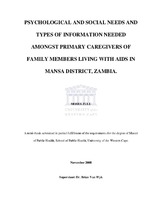| dc.description.abstract | The Zambia Demographic Health Survey reports that 81% of the population of Mansa District, Zambia lives in extreme poverty. Eleven percent (11%) of this population is estimated to be HIV positive. Many of this HIV positive population were the primary breadwinners in their households prior to the onset of AIDS. The majority of them are cared for by family members (PCGs) with limited training. Home Based Care programmes provide care and support to patients at their homes. However, this support does not extend to the caregivers. This explorative study investigated the psychological, social and informational needs of primary caregivers of AIDS patients in Mansa District, Zambia. It was envisaged that the findings of the study would assist home-based care organizations to provide comprehensive support and care to the primary caregivers, in addition to patients. Methods A qualitative research approach was chosen to gain an in-depth understanding of healthrelated
experiences of caregivers while taking into consideration the context within which this phenomenon takes place. Twenty-six caregivers who provide basic care and support to family members who had advanced HIV-disease were recruited into the study. All AIDS patients in the study were former breadwinners of their households. Purposive, maximum variation sampling was used to select non-homogeneous cases of family caregivers, who provided services to AIDS patients within their homes. It was envisaged that such a heterogeneous sample would provide wide variations in experiences, and this
would contribute to the range of issues pertaining to caregiver needs being covered. Three Focus group discussions were conducted, audio-tape recorded and transcribed. Findings The findings of the study highlight that caregivers have the following psychological needs: reciprocated sympathy and appreciation from society and their patients, stress coping mechanisms, and the capacity to display patience despite unreasonable demands made by the patients for whom they are caring. The study highlights that caregivers face numerous challenges in dealing with conflicting relationships and in handling stigma and discrimination, and that they are in need of a strong social support network. It also emphasizes that many of the primary caregivers lack adequate information about social services organizations that can assist them with training. The training will enable those (PCGs) to provide care in a manner that does not compromise the safety of the patients or themselves, as well as give them opportunities for education and skills development for income generation that will make it possible for them to provide for the upkeep of the family. Conclusions Home-based care workers are best placed to support PCGs at home. The training of such home-based workers should be extended to take in consideration the specific needs of these caregivers. In addition, the role of primary caregivers should be acknowledged in national HIV/AIDS strategies. | en_US |

